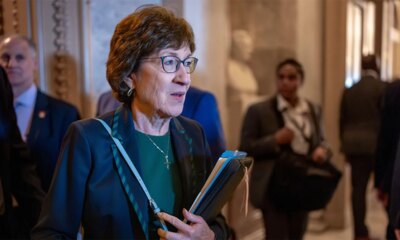Maine
High property taxes in Maine? Mayor says to ‘consider a reverse mortgage’
The mayor of South Portland, Maine, recently acknowledged that property taxes in the region are particularly challenging for those living on a fixed income. When offering advice on how to manage these costs, the mayor brought up the potential for a reverse mortgage.
This is according to local reporting by The Maine Wire from a recent city council meeting. Property taxes in the city — as is the case with many localities nationwide — are higher, and the tax burden is increasingly shifting from commercial to residential properties. This led to discussion of a proposal to “allocate an additional $50,000 to the city’s Senior Property Tax Relief Fund,” according to the outlet.
Such programs exist in other cities and states, and allow older residents to defer tax payments to a later time, but they do not waive them. The age of eligibility for South Portland’s program has been lowered from 70 to 65, so more people are eligible. But in turn, this reduces the potential benefit for individual households.
“This is very much a perfect storm,” Mayor Misha Pride said, according to the reporting. “We live in a coastal community, it’s very attractive to live here. And unfortunately, that means lots of people are buying lots of residential properties.”
With buying and selling activity for commercial real estate diminished, Pride argued that reviewing the percentages and potential new allocations to the program may not be worth it. This led to the mayor’s recommendation, which the reporting said elicited “an audible gasp and agitation among those present at the August meeting.”
“I just throw this out there because I’ve also been thinking a lot about how especially those with fixed incomes can deal with this,” Pride said. “It is kind of a last resort measure, but seeing as our property values are so high, seniors may want to consider a reverse mortgage.”
Pride then read the room’s reaction.
“I know it’s an ugly word, but I’m just saying,” he said. “I know it’s horrible, but it’s sort of a last resort.”
The mayor clarified that he does not make the recommendation lightly, reiterating the “last resort” phrase and saying the idea is only tied to addressing the challenging financial circumstances for the city’s seniors.
“This is really difficult for everyone, we don’t take any pleasure in this, and the city doesn’t get any more money,” he said, according to the reporting. “And that’s something I think is hard for people to hear, is that the city is not getting a penny more from taxes, it’s really truly just a shift of who’s paying them, which is, I think, the hardest thing for people to hear and understand.”
A subsequent meeting on Sept. 3 meeting saw unanimous passage of an additional $100,000 for the tax relief program. HousingWire’s Reverse Mortgage Daily (RMD) reached out to Pride’s office, but he could not be reached immediately.
Pride’s statements are eerily similar to those made by another mayor — in another country —earlier this year. Tim Cadogan, the mayor of the Central Otago district in south central New Zealand, recently fielded a question from a constituent about rising rates that are akin to U.S. property taxes.
After suggesting that reverse mortgages could be employed by qualified borrowers to help pay for the rate increases, local media reported that he received a raft of backlash that accuses him and other elected leaders of being “out of touch.” Another labeled the suggestion “disturbing.”
Cadogan, however, pushed back on these assertions with reasoning similar to Pride’s.
“I was accused […] of being out of touch with reality,” he said in a weekly column published in June. “But, here is the reality of what I was faced with more than once during the drop-in sessions; an elderly person telling me that the proposed rates increases on top of all the other bills that have skyrocketed in recent times would mean they couldn’t afford food or heating.”
Cadogan, like Pride, also labeled the underlying problem as a “perfect storm” that led to the suggested remedy of a reverse mortgage.

Maine
Maine competition gives creative entrepreneurs the chance to win money

BANGOR, Maine (WABI) – If you’ve ever wondered what goes into pitching a good business idea, you might want to stop by a Big Gig event.
The Big Gig Entrepreneurship Pitch Off brings professionals from across the state together to network and pitch their early-stage business ideas for a chance to win $500.
Tuesday’s competition was held at the Salty Brick Market in Bangor, and it drew a lot of spectators.
“The winners of each semifinal event get $500 and the opportunity to compete for $5,000, so that can make a huge impact on a business that’s just getting off the ground,” said Renee Kelly, a Big Gig organizer.
The winner of the competition, Colin McGuire, was also grateful for the opportunity to showcase his idea “Art on Tap,” which would connect local artists with local venues trying to put on events.
“The support tonight is huge, and it’s just giving me more enthusiasm for running with the idea,” he said.
The season finale of the competition will be held May 19th.
The location is yet to be determined.
If you’d like to apply to compete in the contest, you can go to biggig.org.
Copyright 2026 WABI. All rights reserved.
Maine
This Monster Burrito Challenge in Waterville, Maine, Is Not for the Weak

Are you up for a Maine food challenge, or are your eyes bigger than your stomach?
A Waterville staple, Buen Apetito has a monster burrito just waiting for someone to eat it down to the very last bite.
This thing is a beast, literally called La Bestia, and it’s definitely a mighty task for a fearless foodie.
Take on the Buen Apetito La Bestia Food Challenge in Waterville, Maine
According to Buen Apetito, if you can finish a super-sized burrito in 30 minutes or less, you’ll get the $60 meal for free, a La Bestia champion shirt, and a picture on the wall of fame. That’s not to mention the bragging rights of dominating a task few will be able to conquer.
Wondering what’s in the burrito?
The Mexican restaurant shared in a Facebook comment on a post that the burrito is filled with “grilled chicken, chorizo, and tender shredded beef or pork. Built on a layer of seasoned rice, refried beans, and French fries, it’s melted together with a shredded Mexican cheese blend and a drizzle of creamy cheese sauce, sautéed peppers and onions, green salsa, pico de gallo, sour cream, creamy guacamole, and a bed of shredded lettuce all wrapped in three extra-large tortillas fused into one epic wrap.”
Let’s just say that this thing is packed full.
The first La Bestia contender took up his fork and knife in December 2025, but despite coming close, he couldn’t come out with the win.
As of March 2026, the challenge has remained undefeated. But you never know, someone is bound to come out victorious.
Just note that you can only try your hand at this food challenge on Wednesday and Thursday.
Buen Apetito Has Been a Longstanding Waterville, Maine, Restaurant
First opened in 1999, Buen Apeitito has been around for nearly 30 years.
Centralmaine.com reported that the Mexican restaurant was originally located at the Railroad Square complex off Chaplin Street before moving to 99 West River Road in 2023.
A little over a year later, in 2024, Buen Apetito shared on Facebook that it was passing on the torch to new owners, including Dalia, “the heart and soul of [the] kitchen for twenty years,” her daughter, Norma, and Norma’s husband, Shawn.
READ MORE: Famous Maine Restaurant Buen Apetito Adds Powerhouse New Owner to Crew
And it seems like not only are things still going strong, but new additions like La Bestia food challenge are only enhancing the spirit of big flavor and delicious Mexican food at the Waterville staple.
So, you think you’re up for the task of taking down a beast of a burrito at Buen Apetito? Good luck.
You Know You’re From Maine If You’ve Tried All 19 of These Foods
Here’s a number of foods associated with Maine. How many of them have you had?
Gallery Credit: Sean McKenna
The New York Time’s Best Restaurant Lists Feature These 7 Maine Spots
Gallery Credit: Sean McKenna
Maine
How the Good Neighbor Day of Giving telethon is impacting Maine’s communities

BANGOR, Maine (WABI) – Monday’s telethon held by WABI in partnership with Penquis and Heart of Maine United Way Monday raised money for the heating of homes, something so basic, yet so significant in a state like Maine.
Danielle Hewes, Penquis contributor and volunteer, says some people might not even know that they qualify for heating assistance.
“I think there’s this misconception that you can’t get that if you’re working. Like that’s just for people on general assistance. The truth of the matter is this is for the people that are maybe not able to work, but also for the people that are working. They’re making ends meet,” she said.
For Danielle, that’s what makes events like the telethon so special: it’s making a real difference in the community with people who need the help the most.
Speaking about Penquis in particular, she said, “You learn about all of the other things they do and how they help the community and you can’t help but want to be a part of that.”
If you weren’t able to donate Monday, donations are still being accepted.
You can go to homeunitedway.org/heat.
You can also call 941-2800.
Copyright 2026 WABI. All rights reserved.
-

 World7 days ago
World7 days agoExclusive: DeepSeek withholds latest AI model from US chipmakers including Nvidia, sources say
-

 Massachusetts7 days ago
Massachusetts7 days agoMother and daughter injured in Taunton house explosion
-

 Denver, CO7 days ago
Denver, CO7 days ago10 acres charred, 5 injured in Thornton grass fire, evacuation orders lifted
-

 Louisiana1 week ago
Louisiana1 week agoWildfire near Gum Swamp Road in Livingston Parish now under control; more than 200 acres burned
-

 Florida3 days ago
Florida3 days agoFlorida man rescued after being stuck in shoulder-deep mud for days
-

 Oregon5 days ago
Oregon5 days ago2026 OSAA Oregon Wrestling State Championship Results And Brackets – FloWrestling
-

 Maryland3 days ago
Maryland3 days agoAM showers Sunday in Maryland
-

 Wisconsin3 days ago
Wisconsin3 days agoSetting sail on iceboats across a frozen lake in Wisconsin

























